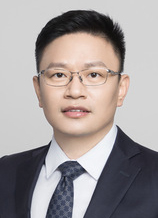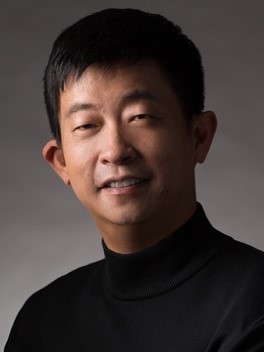
Prof. Xinwei Yao Zhejiang University of Technology, China | Brief Introduction: Dr. Xin-Wei Yao is a Professor in the School of Computer Science and Technology (School of Software Engineering), and the Vice Dean of the Institute for Frontiers and Interdisciplinary Sciences, the director of the Smart Crowd Sensing and Collaboration (SCC) at Zhejiang University of Technology (ZJUT), Hangzhou, China. He received a B.E. degree in Mechanical Engineering from ZJUT in 2008. From March 2012 to February 2013, he was a visiting researcher at the Department of Computer Science at the Loughborough University, UK. He received the Ph.D. degree in Computer Science and Technology from ZJUT in December 2013. From August 2015 to August 2016, he was a visiting Professor at the Department of Electrical Engineering at the State University of New York at Buffalo, USA. His research interests are in the Artificial Intelligence of Things (AIoT), Smart Crowd Sensing and Collaboration, Wireless Nano-Bio-communication Networks, Generalized Artificial Intelligence, Internet of Things (IoT) and so on. In these areas, he has co-authored more than 100 peer-reviewed scientific publications, including three books in English and two books in Chinese, and more than 20 authorized national invention patents in China. He is serving as the leading PI on multiple grants from Chinese Government including the National Natural Science Foundation of China (NSFC), Zhejiang Provincial Science and Technology Department, and the corresponding Industry (leading enterprises). He received the Wu Wen Jun AI Excellent Young Scientist Award (the first youth to receive the award in Zhejiang Province) in 2018, Zhejiang Provincial Natural Science Foundation for Distinguished Young Scholars in 2022, and is the recipient of several other awards from the Goverment, CAAI, CNCA and ZJUT. |
Prof. Zhu Han John and Rebecca Moores Professor ECE Department and CS Department, University of Houston, USA IEEE Fellow,AAAS Fellow | Brief Introduction: Zhu Han received the B.S. degree in electronic engineering from Tsinghua University, in 1997, and the M.S. and Ph.D. degrees in electrical and computer engineering from the University of Maryland, College Park, in 1999 and 2003, respectively. From 2000 to 2002, he was an R&D Engineer of JDSU, Germantown, Maryland. From 2003 to 2006, he was a Research Associate at the University of Maryland. From 2006 to 2008, he was an assistant professor at Boise State University, Idaho. Currently, he is a John and Rebecca Moores Professor in the Electrical and Computer Engineering Department as well as the Computer Science Department at the University of Houston, Texas. Dr. Han is an NSF CAREER award recipient of 2010, and the winner of the 2021 IEEE Kiyo Tomiyasu Award. He has been an IEEE fellow since 2014, an AAAS fellow since 2020, an IEEE Distinguished Lecturer from 2015 to 2018, and an ACM Distinguished Speaker from 2022-2025. Dr. Han is also a 1% highly cited researcher since 2017. Speech Title: Mean FieldGames Guided Machine Learning in Distributed Systems Abstract: Mean field games(MFGs) deal with the study and analysis of differential games (DGs) with a large number of indistinguishable, rational, and heterogeneous players. These methodologies approximate the Nash equilibriums for DGs with symmetric interactions among players. In contrast with classical game theory, where players need to react to every other player separately, MFGs simplify the game by modeling the interaction of a representative player with the collective behavior of the other players. In this talk, we first discuss the basic concepts behind MFGs as well as their difference with classical game theory techniques. Then, we will introduce how MFG can be connected with Artificial Intelligence (AI). Specifically, we will connect MFGs with several popular AI techniques, such as evolutionary neural architecture search with MFG selection mechanism, joint server-selection and handover design for satellite-based federated learning using mean-field evolutionary approach, MFG guided deep reinforcement learning for task placement in cooperative multi-access edge computing. Finally, we conclude with the contributions and advantages that MFG can bring to AI. |
Prof. Jianguo Ma Zhejiang Lab, China IEEE Fellow | Biography: Jianguo Ma received the doctoral degree in engineering in 1996 from Duisburg University, Duisburg, Germany. He was a faculty member of Nanyang Technological University (NTU) of Singapore from Sept 1997 to Dec. 2005 after his post-doctoral fellowship with Dalhousie University of Canada in Apr 1996 – Sept 1997. He was with the University of Electronic Science and Technology of China in Jan 2006 – Oct 2009 and he served as the Dean for the School of Electronic Information Engineering and the founding director of the Qingdao Institute of Oceanic Engineering of Tianjin University in Oct. 2009 – Aug 2016; he joined Guangdong University of Technology as a distinguished professor in Sept 2016 – Aug 2021. Dr. Ma served as the Vice Dean for the School of Micro-Nano Electronics of Zhejiang University in Sept, 2021 – Oct 2022, Starting from 1 Nov 2022 he joins the Zhejiang Lab. His research interests are: Microwave Electronics; RFIC Applications to Wireless Infrastructures; Microwave and THz Microelectronic Systems; He served as the Associate Editor for IEEE Microwave and Wireless Components Letters in 2003 –2005; He was the member for IEEE University Program ad hoc Committee (2011~2013). Dr. Ma was the Member of the Editorial Board for Proceedings of IEEE in 2013-2018 He is Fellow of IEEE for the Leadership in Microwave Electronics and RFICs Applications Dr. Ma was serving as the Editor-in-Chief of IEEE Transactions on Microwave Theory and Techniques in 2020 –2022. |


